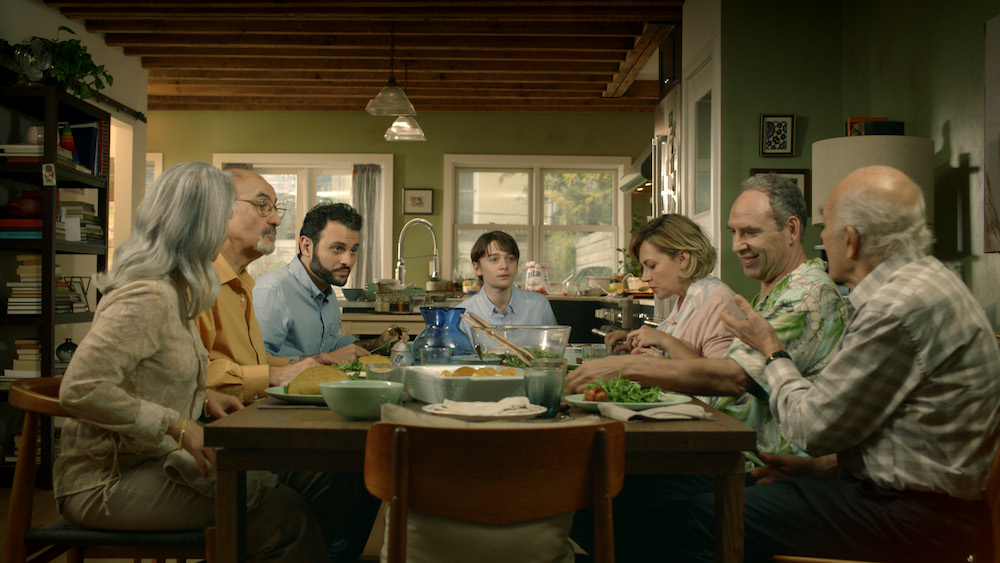‘Abe’: Film Review
By Peter Debruge
LOS ANGELES (Variety.com) – Some kids are raised by a single mother, while others may have two moms. There are plenty out there who’ve been adopted, or else share their parents with half-siblings from multiple marriages. For every “normal family” we see on TV, there are countless others in the real world that defy all the stereotypes — although you’ve gotta admit, the home life depicted in “Abe,” whose Big Apple-based 12-year-old title character (played by “Stranger Things” trouper Noah Schnapp) is the product of a Palestinian father (Arian Moayed) and an Israeli mother (Dagmara Dominczyk), skews awfully far from the ordinary.
Family dinners, which bring together grandparents from both sides to rehash the religious and political disputes of their respective faiths and countries, are never less than awkward. But Abe has an idea, and an obsession. Abe loves to cook. He’s like Julia Child’s “inner child,” and has more “spirit” than Rocco DiSpirito. In an early scene, when it’s time to plan his birthday party, Abe sets out to make his own cake. His dream is to use cooking to unite the two sides of the family, Jewish and Muslim (his parents consider themselves agnostic atheists, but their son wants to attend mosque and have a bar mitzvah, and he dreams of dishes that will combine the two sides of his heritage).
Sure, his plan’s naive, but it just might work — at least, that’s the attitude first-time director Fernando Grostein Andrade adopts in a debut that
We all know kids like this. And if you happen to have one with an aptitude for cooking, “Abe” could well be the perfect thing to be watching at home during the coronavirus shut-in (originally scheduled for a day-and-date theatrical release, the film will now pivot to a digital and VOD release on April 17, some 15 months after premiering in the Kids section of the 2019 Sundance Film Festival). Schnapp brings a quality that’s simultaneously relatable and just the slightest bit awkward, such that one can watch him fixate on cooking and feel inspired, without necessarily being tempted to take things to quite the extreme his character does here.
“Abe” takes place in New York, importing its Semitic ingredients from contemporary Middle Eastern cinema (screenwriters Lameece Issaq and Jacob Kader have Palestinian roots, although it wouldn’t have been the slightest bit surprising to find the same film helmed by an Israeli director). And yet, Grostein Andrade is neither; he hails from Brazil, bringing yet another surprising flavor — a dash of his own cultural background — to this intriguing fusion dish.
Sensing (but not entirely understanding) their son’s interest in all things culinary, Abe’s parents indulge the hobby, enrolling him in a summer cooking camp — which turns out to be as basic as they come. Abe has prodigy-level kitchen skills, and rather than waste his time playing with food coloring and cookie dough, he makes the bold decision to ditch class and sneak out to Brooklyn, where he has discovered a forward-thinking street chef named Chico (Seu Jorge), who is, you guessed it, a Brazilian transplant to New York.
Chico has no interest in babysitting, but Abe is both persistent and persuasive, winning over the self-made chef, who sees potential and takes him on as an apprentice, without realizing that Abe doesn’t exactly have his parents’ blessing. In fact, Abe’s folks have absolutely no idea where he is, which is bound to become a problem, although the movie lets him get away with it for long enough to pick up some key skills (practical tips for aspiring chefs in the audience) and indulge several mouthwatering montages before the consequences catch up with him.
Grostein Andrade directs with energy and enthusiasm, especially when it comes to communicating the online dimension of Abe’s social life (all his friends are virtual, though negative comments can still feel intensely personal). Among “Abe’s” strengths is that the film never talks down to its child characters or the audience. Over dinner with his maternal grandfather (Mark Margolis) and Uncle Ari (Daniel Oreskes), Abe asks permission to taste the wine the adults are drinking. This is the Jewish side of the family, where alcohol is allowed. But on the Muslim half, his grandparents (Salem Murphy and Tom Mardirosian) are disapproving of such behavior, and not shy about picking fights about Israel, as if the other half of the family were directly responsible for these grievances.
No wonder Abe finds it all so overwhelming. His solution — to organize a meal in which he concocts original recipes mixing Palestinian and Israeli ingredients — plays out in a similarly realistic fashion, with entirely plausible results. Here, it might actually have been nice for the film to be more fanciful. It’s kind of a tradition among cooking-themed movies (from “Like Water for Chocolate” to “Chocolat”) for a bit of magical embellishment to sneak into the kitchen. “Abe” is stubbornly earthbound by contrast, but that’s OK. It’s more responsible this way, and young audiences will devour it with no less enthusiasm.

